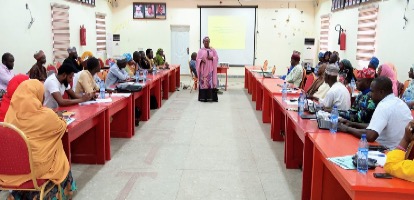The Kaduna State Government, with support from UNICEF, has taken steps to strengthen nutrition data management to improve decision-making and quality of service delivery across the state.
The Kaduna State Nutrition Officer, Ramatu Haruna, stated this at a two-day training on Nutrition Data Management, organised by the State Primary Health Care Board (KSPHCB) in Zaria on Tuesday.
The training, supported by UNICEF, was conducted for state officials, local government health authorities, nutrition focal persons and monitoring and evaluation officers.
Haruna noted that over the years, there have been challenges on data management at different levels, adding that the training was to increase capacity and enhance skills in nutrition data management.
“Currently, the state, in partnership with UNICEF, is implementing Community Management of Acute Malnutrition (CMAM) in 107 Out-Patient Therapeutic Centres in 21 Local Government Areas.
READ ALSO: Kaduna govt treated 20,334 malnourished children in 2022
“Also, the Community Infant and Young Child Feeding programme is being implemented in the whole 23 LGAs of the state.
“Data from these activities are collected periodically and shared with all stakeholders at all levels for decision making,” she said.
Also speaking at the event, the Kaduna State Integrated Data Control Coordinator, Jibril Isah, said the objective of the training was to strengthen competencies of HMIS and nutrition officers on the National HMIS data collection tools.
He stated that the training was also to strengthen the competencies of participants to conduct robust desk reviews and analysis of programme data and also conduct supportive supervision strategies focused on data quality.
On his part, the Director, Family and Community Health Services, KSPHCB, Dr Neyu Iliyasu, highlighted the key role of quality data in decision making for nutrition and other health services.
Iliyasu stated that improving the capacity of data managers would significantly improve the quality of nutrition data across the council areas to enable the local councils and state government make informed decisions.
- EFCC chair: How Yahaya Bello declined invitation for interrogation - April 23, 2024
- EFCC chairman: I’ll resign if Yahaya Bello is not prosecuted - April 23, 2024
- EFCC: Yahaya Bello withdrew $720,000 from Kogi account to pay child’s school fee - April 23, 2024










